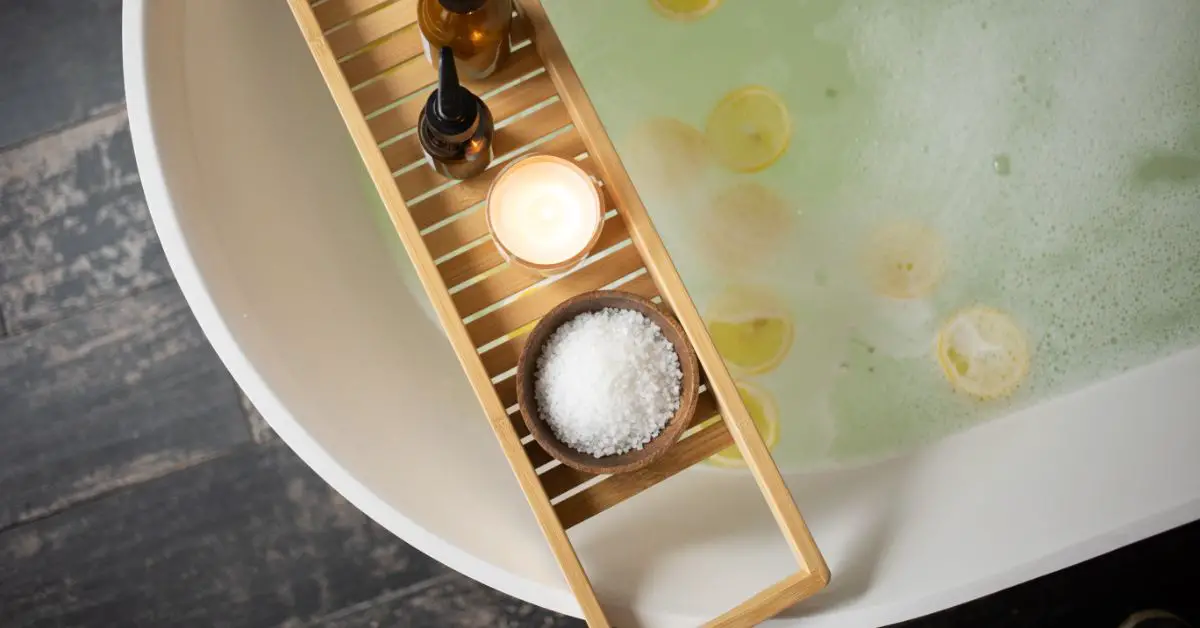Wondering if you can you take an epsom salt bath while pregnant? Here’s everything you need to know about how to do it properly.
The products mentioned on this page were independently selected by Babycious editors. As an Amazon Associate, Babycious may earn a commission from qualifying purchases.

Photo by Monstera
An Epsom salt bath can be just what you need to ease those pains and aches that come along with pregnancy. The magnesium sulfate in Epsom salt can help to relax the muscles and ease the tension that can lead to pain.
So if you’re wondering if you can take an Epsom salt bath while pregnant, the answer is a resounding Yes! Doctors and midwives often encourage their patients to take Epsom salt baths throughout pregnancy, especially during the third trimester because of the stress and muscle relief they bring.
Epsom salt, also known as magnesium sulfate, is a naturally occurring compound of magnesium and sulfate. It has been used for centuries to treat a variety of ailments, including muscle pain and tension, constipation, and even migraine headaches.
How Epsom Salt Baths Work Their Magic
If you’re skeptical about how an Epsom salt bath can help relieve pain, it’s all thanks to magnesium sulfate. When you soak in an Epsom salt bath, your body actually absorbs magnesium sulfate through the skin. The absorbed magnesium helps to promote the relaxation of the muscles, as well as ease tension and pain.
To get the most out of your Epsom salt bath, make sure you’re using high-quality salts. I highly recommend the Dr. Teal’s brand in lavender scent, after having tried numerous “high-end” brands of Epsom salt. Also, be sure to use enough, not just a sprinkle as you would do with regular bath salts.
For a standard-size bathtub, you’ll need to use at least 2 cups of Epsom salt and let them dissolve in the warm water before getting in.
Keep in mind though, that Epsom salt baths are not to be considered a treatment. Because the magnesium compound has to cross into the muscle cells going through the different layers of skin, very scant amounts of magnesium actually get to the muscle. So, if you have low magnesium levels, you’ll need to supplement with magnesium sulfate orally or rectally to get your levels up. If you’re worried about your magnesium levels, consult with your OB at your next appointment.
5 Proven Benefits of Taking Epsom Salt Baths During Pregnancy
Having taken myself dozens of Epsom salt baths during pregnancy (during all 3 trimesters), I can attest to the benefits and I can’t emphasize enough how much easier those baths made my third trimester. Here are 5 ways that Epsom salt baths can help you during pregnancy:
- Eases muscle tension and pain: Soaking in an Epsom salt bath can help to ease the muscle tension and pain that can come from pregnancy. The magnesium sulfate helps to relax the muscles, which in turn can help to ease the pain.
- Helps with hemorrhoids: If you’re battling with hemorrhoids (a common pregnancy woe), an Epsom salt bath can help to ease the pain and inflammation.
- Helps with swollen feet: The magnesium sulfate in Epsom salt can help to reduce swelling, not just in the feet, but also in the hands and legs.
- Great for relaxation: Warm baths in general feel great at the end of a long day, but adding Epsom salt to the water can help you to relax even more. The magnesium sulfate has a calming effect on the nerves and can help to ease stress and anxiety, so it will help you get some better sleep also.
- Replenishes your salt levels: If you’ve been sweating a lot due to pregnancy (or just the hot weather), you may be low on salt. Soaking in an Epsom salt bath can help to replenish your salt levels and re-balance your electrolytes.
5 Safety Tips for Taking an Epsom Salt Bath While Pregnant
Because they are so great, Epsom salt baths can quickly become addictive. But, like anything else during pregnancy, you need to take them in moderation and follow some safety guidelines. Here are 5 tips for safely taking Epsom salt baths while pregnant:
Take Warm but Not Hot Baths
You want your bath to be warm, not hot. Hot baths can cause you to feel faint and dizzy and can also increase your risk for dehydration. Ideally don’t start the bath water over 102 degrees (about 38 degrees C), so that your core temperature remains within the safe threshold.
Baths also cool down while you’re soaking, unlike hot tubs, so just make sure that you don’t add any more hot water to the bath after you’ve gotten in. If you feel at any point uncomfortable sitting in the bath, your baby might be uncomfortable as well.
Don’t Stay in Too Long
You may want to stay in your bath until the water gets cold, but that’s a bad idea. You don’t want to risk getting dehydrated or overheating, so it’s best to get out after 15-20 minutes.
15 to 20 minutes of soaking in the Epsom salt bath is more than enough to allow the magnesium present in the water to be absorbed by your body and to reap the benefits.
Clean the Bathtub Thoroughly Before Taking the Bath
This sounds pretty obvious, but it’s important to pay attention to nonetheless. You want to make sure to give your tub a good scrub using a nontoxic cleaner so that the bathtub is clean before you get in, to avoid any infections.
This is especially important in the third trimester when you’re more susceptible to infection, and becomes a vigilance point once you lose your mucus plug towards the end of your pregnancy.
Keep Your Belly Afloat
To be extra safe while taking your Epsom salt bath, it’s better to avoid having your belly submerged in the water. This is actually easy to apply since your bump is probably already prominent and you couldn’t submerge it in the water if you wanted to.
A pro tip for extra relaxation is to bring a small towel into the bathtub with you. Dunk it in the warm bath water to soak that delicious warmth and cover your exposed belly to keep it warm and cozy.
Stay Very Hydrated
We can’t emphasize enough how important it is to stay hydrated when you’re pregnant, and that includes while taking an Epsom salt bath. Make sure to drink plenty of fluids before and after your bath, and have a glass of water next to the tub so you can easily grab it if you start to feel thirsty.
It’s also important not to drink any fluids other than water while you’re in the tub. Caffeinated beverages can actually dehydrate you, and alcoholic beverages are obviously a no-no during pregnancy. So stick to plain old H2O.
Final Thoughts
Epsom salt baths are an excellent way to relax and ease pregnancy aches and pains. But as with anything else during pregnancy, it’s important to take them in moderation and be aware of some safety guidelines. But as long as you do that, you’ll be able to enjoy all the benefits that Epsom salt baths have to offer.
The purpose of this article is informative and educational only. It’s not a substitute for medical consultation or medical care. We do not accept any responsibility for any liability, loss, or risk, personal or otherwise, incurred as a consequence, directly or indirectly, from any information or advice contained here. Babycious may earn compensation from affiliate links in this content.


